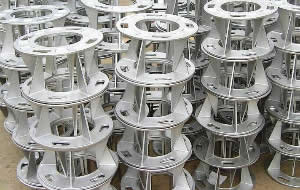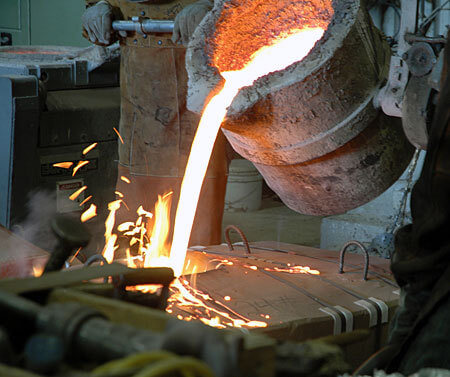Exploring how an Aluminum Foundry delivers high-quality results
The Duty of Aluminum Foundries ahead of time Lightweight Manufacturing Solutions
Light weight aluminum factories substantially add to the development of light-weight production solutions. Their ingenious spreading innovations generate high-strength, lightweight elements essential for sectors like automobile and aerospace. This improvement not just enhances item performance but additionally advertises sustainability with making use of recycled products. As these factories adjust to emerging techniques and innovations, they lead the way for future advancements in producing effectiveness and environmental duty. What exists ahead in this transformative journey?
The Benefits of Lightweight Products in Production
As markets progressively seek effectiveness and sustainability, the adoption of light-weight products in manufacturing has become a crucial method - Precision aluminum casting. These products, especially aluminum and compounds, supply countless advantages that boost production processes and product efficiency. Mostly, their reduced weight adds to lower power consumption during transport and procedure, causing considerable cost financial savings
Light-weight products promote the layout of more complicated geometries, allowing for higher technology in product advancement. This adaptability commonly results in enhanced functionality and performance, providing to the progressing needs of modern customers.
Additionally, making use of lightweight products can improve the long life of products due to their resistance to rust and fatigue. This sturdiness not only minimizes upkeep prices yet likewise sustains sustainability campaigns, as longer-lasting products add to much less waste. To summarize, the advantages of light-weight materials are critical in driving effectiveness, innovation, and environmental responsibility in production.
Technologies in Aluminum Casting Technologies
Current innovations in aluminum casting modern technologies are transforming the production landscape, specifically in the manufacturing of light-weight elements. Developments such as high-pressure die spreading and vacuum cleaner pass away casting have substantially boosted the precision and surface area finish of aluminum components - Aluminum Foundry. These methods permit for the creation of complicated geometries while decreasing product waste and improving mechanical homes

Additionally, the application of real-time surveillance systems assures high quality control throughout the spreading procedure, resulting in even more constant item end results. Jointly, these technologies not only boost the performance of light weight aluminum elements but likewise support the market's shift towards even more lasting production practices.
Applications of Aluminum Elements in Numerous Industries
While aluminum elements have actually long been made use of in various sectors, their convenience and lightweight buildings remain to drive innovative applications throughout sectors such as auto, aerospace, and building. In the vehicle industry, light weight aluminum is increasingly used for engine blocks, wheels, and body panels, boosting gas effectiveness and efficiency. Aerospace suppliers utilize light weight aluminum for aircraft structures and components, capitalizing on its strength-to-weight ratio to improve fuel economy and payload capability.
In the building industry, aluminum is favored for home window frames, roof covering, and structural components, supplying toughness and resistance to corrosion while minimizing overall building weight. In addition, the electric and electronic devices industries gain from aluminum's conductivity and light-weight nature, using it in electrical wiring, enclosures, and warm sinks. These diverse applications highlight the critical role of light weight aluminum parts, which not only satisfy market demands yet likewise add to advancements in item layout and capability across multiple areas.
Sustainability and Energy Performance in Light Weight Aluminum Foundries
The aluminum shop sector plays a vital duty in promoting sustainability and power effectiveness, specifically as demand for lightweight elements continues to expand across various markets. Factories are significantly adopting eco-friendly techniques, such as utilizing recycled light weight aluminum, which considerably reduces power usage and greenhouse gas discharges compared to primary aluminum manufacturing.
Improvements in casting modern technologies boost energy effectiveness by optimizing the melting procedures and reducing waste. Strategies like die spreading and investment spreading permit for specific product usage, reducing excess and scrap.
In addition, lots of shops are spending in renewable resource resources to power procedures, better reducing their carbon impact. Implementing power management systems enables foundries to keep track of and boost power usage, look what i found ensuring they run at peak effectiveness.

Future Fads in Lightweight Production Solutions
How will arising modern technologies shape the future of light-weight production options? Advancements such as advanced materials, automation, and additive manufacturing are established to redefine production procedures. The combination of smart production innovations, consisting of the Web of Things (IoT) and artificial intelligence (AI), will certainly allow real-time surveillance and optimization, enhancing performance and decreasing waste.

As sustainability proceeds to be an extremely important problem, light-weight solutions will progressively concentrate on recycling and reusing materials, lining up with circular economic situation concepts. This evolution in light-weight manufacturing will not just improve item efficiency however also contribute to ecological objectives, ensuring that the market stays competitive in a quickly changing market landscape.
Often Asked Questions
Exactly How Do Aluminum Foundries Guarantee Quality Assurance in Production?
Aluminum shops ensure high quality control in production via extensive screening, standard procedures, and continual tracking - Precision aluminum casting. They carry out skilled personnel and advanced modern technologies to preserve consistency, decrease flaws, and satisfy sector standards throughout the production procedure
What Are the Main Challenges Encountered by Light Weight Aluminum Foundries?
Aluminum factories deal with difficulties such as fluctuating resources costs, preserving production effectiveness, making sure consistent quality, adapting to technological innovations, and conference ecological guidelines, all of which effect their overall operational performance and competition in the market.
Just How Does Aluminum Recycling Effect Factory Operations?
Light weight aluminum recycling substantially improves shop procedures by minimizing resources costs, lessening power consumption, and reducing ecological effect. This sustainable practice enables factories to improve performance while meeting enhancing demand for lightweight, high-performance aluminum products.
What Skills Are Needed for Workers in Aluminum Foundries?
Employees in light weight aluminum factories call for skills in metallurgy, machining, top quality control, and safety practices. Effectiveness in running equipment, understanding alloy residential or commercial properties, and analytical are likewise necessary for effective production and preserving high safety criteria.
Exactly How Do Light Weight Aluminum Foundries Deal With Waste Management?
Light weight aluminum factories take care of waste with recycling scrap metal, using efficient waste partition methods, and sticking to ecological regulations. They apply lasting techniques to decrease land fill contributions, guaranteeing that hazardous products are gotten rid of responsibly.
Light weight aluminum factories greatly contribute to the development of light-weight manufacturing solutions. Recent developments in light weight aluminum casting innovations are reinventing the production landscape, specifically in the manufacturing of lightweight parts. While aluminum components have actually long been utilized in different markets, their convenience and lightweight buildings continue to drive innovative applications throughout fields such as auto, aerospace, and building. Additionally, the electrical and electronic devices markets profit from aluminum's conductivity and lightweight nature, utilizing it in circuitry, enclosures, and heat Learn More sinks. The light weight aluminum factory sector plays a crucial function in promoting sustainability and click this energy effectiveness, especially as demand for lightweight components continues to expand across different sectors.